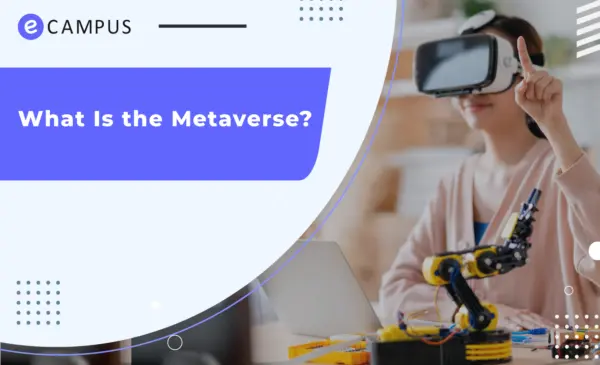Is the Metaverse Transforming future eLearning?
For ages, our educational system has included physical education. The covid epidemic, however, recently disrupted it. In addition, as a result of the pandemic, digital learning took off and spread throughout most institutions, changing the conventional learning paradigm to one that is more technology-driven. The metaverse new technology is being developed to do away with real-time interactions in this e-learning environment. The rapidly expanding applications of the metaverse in various industries, including gaming, have given birth to the possibility of using it in education. However, before using the metaverse to power educational applications, it’s critical to comprehend its underlying principles.
What Is the Metaverse?
The idea of the metaverse is a persistent, online, 3D environment that merges several virtual worlds. It can be compared to an advanced version of the internet. Users would be able to collaborate, meet, play games, and socialise in these 3D environments because of the metaverse. Every techie started learning more about the metaverse after Mark Zuckerberg’s latest presentation to the world.
Some platforms include components that resemble the metaverse; however, it is not yet fully achieved. The concept “metaverse” has become popular in the tech world. The eLearning industry will benefit from it. We can get closer to the creation of the metaverse with the integration of VR and AR technology into eLearning programs.
Metaverse Learning
The experts claim that if the metaverse can follow the best learning guidelines, it has the power to alter how lessons are delivered and how students learn. Learning is made interesting and significant by providing a way to recreate anything, from a conversation to a treatment.
Virtual reality (VR) based teaching can blur the distinctions between disciplines by demonstrating how diverse concepts can be applied to actual circumstances. In the future, Virtual reality (VR) might be used to teach both technical skills like wiring a plug or installing a drain, as well as sophisticated medical operations like surgery. The creation of images and objects in augmented reality places them in a natural setting where they can interact with it.
Whereas in augmented reality (AR) images and objects are created in augmented reality and placed in a natural setting where they can interact with the environment. Pokémon GO is a fantastic illustration of an augmented reality game where players and pokemon interact with the actual environment. As a result, it can deliver a superior video experience, enable live streaming, and support 3D visualisation on eLearning platforms.
Benefits of Metaverse in Education
1. Interactive teaching and practical application of knowledge
With a virtual reality headset, students can explore environments and activities that they would not be able to do in the real world. Through this virtual environment, students from around the world can participate in classroom discussions. With the creative learning environment in the classroom, they are more likely to remember the information taught by their teachers.
2. Gamification
With the Metaverse, learning can be fun. When students have a goal in mind, learning becomes more engaging. Students are encouraged to complete tasks, focus, and finish work when gamification components like badges and quests are introduced into the classroom.
3. Improved test outcomes
Even though interactive experiences help students learn more and become subject matter experts thanks to Metaverse, the true effectiveness of this technology can only be judged by its results. Only if it helps students achieve high academic performance can it convince teachers, parents or other members of the teaching community and be easily accepted. To assess this, the effectiveness of virtual reality immersive learning in improving test scores was studied. The results showed that the students who participated in the VR program performed better than the control groups in terms of their test scores. According to the study, immersive learning in virtual reality could replace learning in school.
Conclusion
Education and social relations will take on a new dimension in the future with the advent of the Metaverse. By offering them a more immersive experience, Metaverse adds a new feather to each sector.I have no doubt that the Metaverse will bring about a revolution in schooling. With the help of the Metaverse, immersive education has already begun in some schools. As it progresses, it will be inevitable that at least one of their classes will take place in the Metaverse.



Leave a Reply